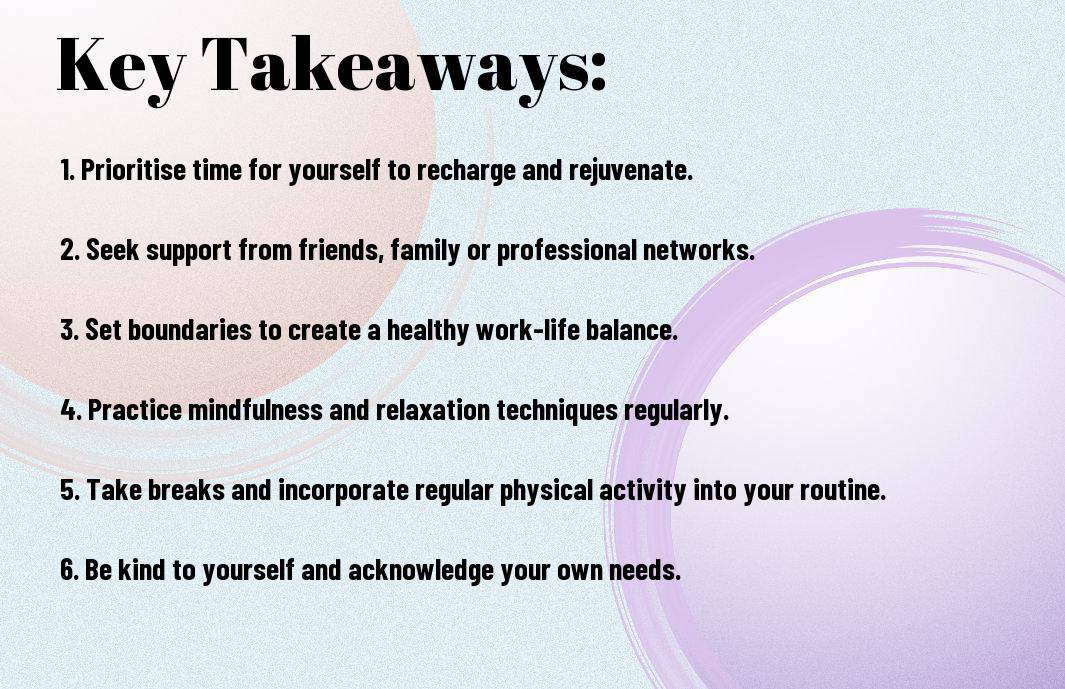Greetings, weary parents. It’s time to address the elephant in the room – the importance of self-care for parents. In the midst of managing hectic schedules, juggling multiple responsibilities, and keeping up with the demands of parenthood, it’s all too easy to find oneself on the fast track to burnout. In this informative blog post, we will delve into the dangerous impact of chronic stress on both physical and mental well-being, as well as explore strategies for managing stress and avoiding burnout. We will also highlight the positive effects of prioritising self-care and provide practical tips to help parents cultivate a healthier, more sustainable lifestyle. So grab a cup of tea, find a quiet corner, and let’s embark on this journey together.
Key Takeaways:
- Self-care is essential: As a parent, it’s important to prioritise your own well-being and take time for self-care activities to manage stress and avoid burnout.
- Set boundaries: Establish clear boundaries between work, family, and personal time to prevent feeling overwhelmed and overworked.
- Reach out for support: Don’t be afraid to ask for help from friends, family, or professionals when feeling stressed or burnt out. Seeking support is a sign of strength, not weakness.


Recognizing the Signs of Stress and Burnout
It is essential for parents to be able to recognise the signs of stress and burnout in order to take proactive measures to address these issues. Failure to recognise and address these signs can lead to more serious physical and emotional consequences.
Physical and Emotional Symptoms
Physical symptoms of stress and burnout may include fatigue, headaches, muscle tension, and changes in appetite or sleep patterns. Emotionally, parents may experience irritability, mood swings, anxiety, or feelings of being overwhelmed. It is important to recognise these symptoms and take them seriously, as they can have long-term effects on well-being.
Impact on Parenting and Family Life
Stress and burnout can have a significant impact on parenting and family life. Parents may find themselves less patient and more prone to outbursts of anger. They may also struggle to provide the emotional support and stability that their children need. It is crucial to address these issues promptly, as they can affect the overall dynamics and well-being of the family unit.
Ignoring these symptoms can lead to further strains on the family, potentially leading to long-term damage to relationships and mental health for both parents and children.

Strategies for Managing Stress
Time Management and Prioritizing Self-Care
One of the most effective strategies for managing stress as a parent is through effective time management and prioritising self-care. It’s crucial to carve out time for yourself amidst the demands of parenting. This could mean setting aside a few minutes each day for relaxation or scheduling regular self-care activities, such as exercising or having a hobby.
When managing your time, it’s important to identify your priorities and allocate time to them. This may involve saying no to certain commitments or delegating tasks where possible. By prioritising self-care and managing your time effectively, you can reduce stress and prevent burnout.
Mindfulness and Relaxation Techniques
Practising mindfulness and relaxation techniques can significantly reduce stress levels and promote emotional well-being. Taking time to engage in activities such as meditation, deep breathing exercises, or yoga can help you stay grounded and calm, even in the midst of chaos. These techniques can be incorporated into your daily routine or used as needed during particularly challenging moments.
By practising mindfulness and relaxation techniques, you can learn to manage your emotions and respond to stressful situations with greater clarity and composure. This can have a profound impact on your overall well-being and your ability to cope with the demands of parenting.
For further information on mindfulness and relaxation techniques, consider seeking out resources such as mindfulness courses, relaxation apps, or self-help books. These tools can provide additional support and guidance as you incorporate these practices into your daily life.
Building a Support System
One of the key strategies in managing stress and preventing burnout as a parent is to build a strong support network. This network can consist of various sources, including friends, family members, and professionals who can provide emotional, practical, and psychological support. Research has shown that having a robust support system in place can significantly reduce the risk of burnout and improve overall well-being.
For more information on how to prevent burnout and self-care tips for parents and caregivers, you can visit Avoiding burnout: self-care tips for parents and caregivers.
Seeking Professional Help when Necessary
In some cases, the stress and demands of parenthood may become overwhelming, and seeking professional help from therapists, counsellors, or support groups may be necessary. It is important to recognise when your own coping strategies are not sufficient and to seek assistance from qualified professionals. Ignoring the signs of burnout and not getting the help you need can have significant negative consequences for both you and your family.
Creating a Solid Network of Family and Friends
Building strong connections with family and friends can provide a vital source of support and comfort during challenging times. Whether it’s having someone to talk to, help with childcare, or simply offering a listening ear, the solidarity of your loved ones can strengthen your resilience and alleviate the pressures of parenting. Maintaining these relationships and actively seeking support when needed are crucial steps in preventing burnout and promoting well-being.
Having a supportive network of family and friends can positively impact your mental and emotional well-being, providing a protective factor against parental burnout and enhancing your overall ability to cope with stress.
Incorporating Self-Care into Daily Routines
Setting Realistic Goals and Expectations
Setting realistic goals and expectations is crucial for maintaining balanced self-care as a parent. It’s important to acknowledge that there are only so many hours in a day, and it’s essential to prioritize tasks and responsibilities. By setting achievable goals and expectations, you can avoid unnecessary stress and prevent burnout. Avoid comparing yourself to others and instead focus on what works best for you and your family. This will help you stay on track with your self-care routine without feeling overwhelmed.
Balancing Parenting with Personal Interests and Activities
Finding a balance between parenting and personal interests and activities is essential for maintaining a sense of identity outside of being a parent. It’s important to carve out time for activities that bring you joy and fulfilment, whether it’s pursuing a hobby, exercising, or spending time with friends. By prioritizing these personal interests and activities, you can recharge and rejuvenate, which ultimately benefits both you and your children.
Remember that taking time for yourself is not selfish, but rather a necessary part of maintaining emotional and mental well-being as a parent. By finding a balance between your parenting responsibilities and personal interests, you can lead by example and demonstrate the importance of self-care to your children.
FAQ
Q: What is parent self-care?
A: Parent self-care refers to the practice of parents taking time to look after their own physical, mental, and emotional wellbeing.
Q: Why is managing stress important for parents?
A: Managing stress is important for parents as it can have a significant impact on their ability to care for their children and maintain a healthy family dynamic.
Q: What are some effective strategies for managing stress as a parent?
A: Effective strategies for managing stress as a parent include prioritising self-care, setting boundaries, seeking support from friends and family, and practicing relaxation techniques.
Q: How can parents avoid burnout?
A: Parents can avoid burnout by recognising the signs of burnout, setting realistic expectations for themselves, and taking regular breaks to rest and recharge.
Q: What role does regular exercise play in parent self-care?
A: Regular exercise plays a crucial role in parent self-care as it can help reduce stress, improve mood, and boost energy levels, ultimately enhancing a parent’s ability to cope with the demands of parenting.
Q: How can parents make time for self-care in their busy schedules?
A: Parents can make time for self-care by prioritising and scheduling it into their daily or weekly routines, delegating tasks, and being willing to ask for help when needed.
Q: What should parents do if they are struggling with stress or burnout?
A: If parents are struggling with stress or burnout, it is important for them to seek support from healthcare professionals, join a support group, or speak to a therapist to address their mental and emotional wellbeing.







